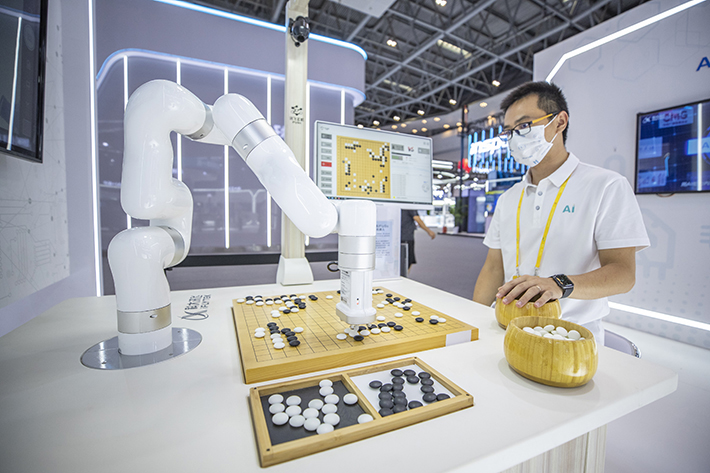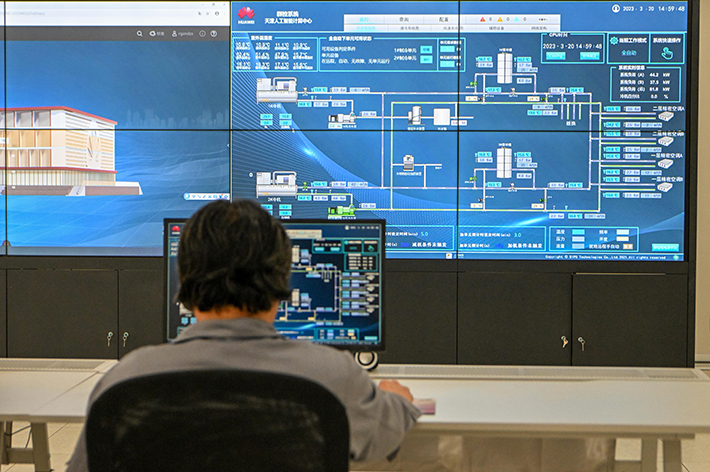|
||||||||||
| Home Nation World Business Opinion Lifestyle ChinAfrica Multimedia Columnists Documents Special Reports |
|
||||||||||
| Home Nation World Business Opinion Lifestyle ChinAfrica Multimedia Columnists Documents Special Reports |
| ChinAfrica |
| The Future Has Arrived |
| China’s AI sector is growing |
| By Ge Lijun 丨VOL. 15 May 2023 ·2023-04-19 |

A man plays Go game with a robot at the iFLYTEK booth at Smart China Expo in Chongqing in August 2022 (XINHUA)
An intelligent chatbot named ChatGPT has gained a reputation all around the globe. Building on this trend, well-known IT businesses like Google and Adobe have released their own generative artificial intelligence (AI) models. The formal introduction of Ernie Bot by Baidu, the biggest search engine in China, on 16 March sparked yet another contentious debate in the country.
In fact, smart scenes in production are commonplace, including the automation of container shipping terminal operations, intelligent unmanned exploration of mining areas and autonomous driving. According to He Baohong, director of the Cloud Computing and Big Data Research Institute of the China Academy of Information and Communications Technology (CAICT), a growing number of industries and fields are accelerating their adoption of AI, boosting the iteration and upgrading of AI technology and the overall progress of industry development.
According to the recent statistics from CAICT, China’s AI industry grew by 18 percent annually to 508 billion yuan ($74 billion) in 2022. AI has developed into a fully functional industrial system and is now a new growth engine.
More innovative
Voice interaction, voice-controlled workshops, AI quality inspection, service robots... AI is being used in a wide variety of industrial and daily life applications that benefit the general population. According to Pan Yunhe, academician of the Chinese Academy of Engineering and professor at Zhejiang University, the progress of AI lies in the combination of all areas of life with economic and social development.
Currently, intelligent transportation and autonomous driving are significant application areas for AI. A passenger can hire a taxi in Beijing’s National Economic and Technological Development Zone without a driver. This is a fully driverless autonomous driving service called Apollo Go developed by Baidu, which was recently approved for demonstration in Beijing.
According to a Baidu official, the autonomous driving system can effectively recognise the driving environment and deal with challenging road conditions thanks to an environmental perception system made up of sensors including camera, lidar, and millimetre-wave radar. Many Chinese cities, including Beijing, Wuhan, and Chongqing, among others, have Apollo Go on the streets.
The use of AI across multiple businesses is starting to show results. An Hui, deputy chief engineer at the China Centre for Information Industry Development, claims that the integration covers a variety of industries, including tourism, agriculture, and other sectors in addition to manufacturing, transportation, and medicine. In general, the most popular application areas for AI deployment are in finance, health care, security, and intelligent transportation.
Both local and international businesses have increased their investment in R&D in recent years. Chinese companies have made major advances in essential technologies like application algorithms, smart chips, and the open-source framework, according to the Ministry of Industry and Information Technology; application technologies like image recognition and voice recognition are among the best in the world.
A large number of Chinese AI-related companies are developing rapidly. According to data from Qcc.com, new Chinese AI companies have been registered more often over the previous 10 years, increasing by 18.55 percent in 2022.
Since its founding in 1999, iFLYTEK has been engaged in the research of key technologies such as intelligent voice, natural language understanding and computer vision. In order to provide developers with AI solutions, a Chinese business introduced the iFLYTEK Open Platform in 2010. This open AI platform is focused on intelligent speech and human-computer interaction. On the platform, iFLYTEK has launched in-depth intelligent products and services covering a wide range of sectors, such as education, health care, financial technology, and smart cars.
Additionally, iFLYTEK has continued to work closely with different countries in Africa. A partnership agreement between the company and the Artificial Intelligence and High-Performance Computing Applications Centre of Egypt’s Ministry of Communications and Information Technology was signed on 21 July 2020. It focuses on cooperative research initiatives on Chinese-Arabic translation, text-to-speech, and Arabic voice recognition. “The signing of this cooperation agreement represents an important practice in responding to the Belt and Road Initiative and serving the construction of the community of shared future,” Jeffrey Wang, business manager of Middle East and North Africa at iFLYTEK told ChinAfrica, the project enhances research in Chinese-Arabic translation as well as commercial and trade interactions with countries taking part in the initiative.

A technician monitors the operation of equipment in Tianjin AI Computing Centre on 20 March
More potential
The innovative development of AI cannot happen without a political orientation, a strong industrial system and a positive response on the application side to form a good ecological environment.
In recent years, China has put in place a number of policies to encourage the development and innovation of the AI sector. China has also relied on leading companies to establish more than 10 national open innovation platforms featuring new-generation AI; it has promoted the large-scale application of AI technology in areas of health care and elderly care, as well as urban construction, by publishing a catalogue for the promotion of intelligent products.
Chen Jiachang, director general of the Department of High and New Technology of China’s Ministry of Science and Technology, told a press conference that in the field of AI, the ministry is focusing on strengthening high-level design, establishing a planning and promotion office, and launching the implementation of major scientific and technological projects of a new generation of AI. At the same time, in response to some of the risks and problems associated with the development of AI, the Governance Principles for a New Generation of AI: Develop Responsible AI were formulated and published in order to steer the technology to the side of good and in the interest of humanity.
Companies are the key actors of scientific and technological progress. “Innovation in AI should stick to systematic innovation in source technologies,” said Wang. According to him, in order to overcome the main challenges of social development, “a systematic scenario must be established.” It is not simply a technological challenge, but also a chessboard that encompasses situations, requirements, resources, education and research, and business models.
For Hu Zhipeng, senior vice president of NetEase, a Chinese internet and online gaming services provider, the first thing to do is to solve the problem of computing power. Many AI technologies and applications today depend on large quantities of processing power. However, the restriction of high-end processors by the US and other Western countries would surely lead to a shortage of processing capacity for local enterprises, he warned. In view of this potential situation, the Ministry of Science and Technology is actively promoting the construction of computing power networks to provide strong support for the development of China’s digital sector.
Focusing on technology breakthroughs and application expansion and based on the advantages of China’s large-scale market capable of drawing global resources, the AI industry is fully integrated into the real economy and has become a new growth engine for economic and social development. According to the projections regarding Next Generation AI Development Plan issued by the State Council in 2017, by 2030, the value of the major AI sector would reach 1 trillion yuan ($145 billion).
“The next decade will be the golden decade for AI development, bringing revolutionary changes to thousands of industries,” claimed Yuan Hui, CEO and founder of Xiao-I Corp., a Chinese AI company.
|
||||||||||||
| About Us | Contact Us | Advertise with Us | Subscribe |
| Copyright Beijing Review All rights reserved 京ICP备08005356号-5 京公网安备110102005860号 |